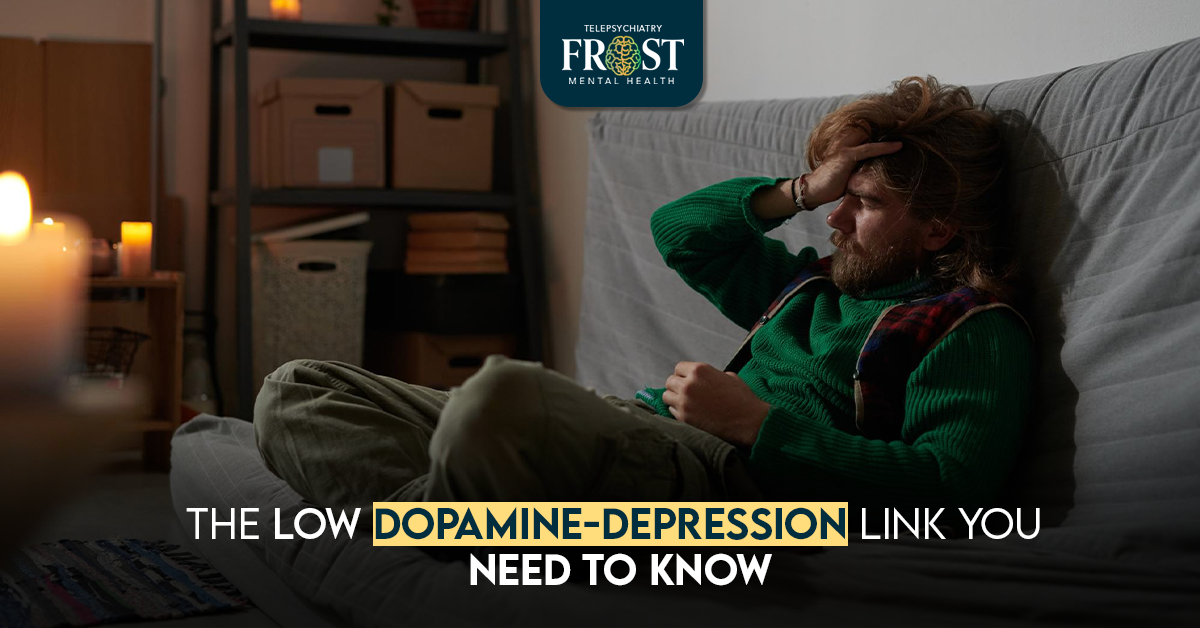While a lot of people know dopamine as the ‘feel good’ chemical, more people are not aware of its role in mental health.
Precisely, there is an insightful and increasing awareness of how low levels of dopamine correspond to depression and the way it affects our thoughts, feelings, and actions in the course of our days.
Continue reading to get into the low-dopamine depression connection, how it affects you, and steps you can take to work toward balance.
What Exactly Is Dopamine?
Think of dopamine as your brain’s natural motivator and reward system.
Functioning properly, it brings that nice feeling of having meaningfully achieved something, through delighting in a tasty meal, or having moments of connection.
Dopamine plays essential part in:
- Motivation and drive
- Experiencing pleasure and reward
- Focus and attention
- Motor control and physical movement
- Sleep regulation
- Mood stability
When Dopamine Levels Drop
When your levels of dopamine are low, they can adversely affect your day-to-day life. You might notice:
- Your normal interests no longer make you happy. That book you were thrilled to read gathers dust; the activity that used to give you stimulus now leaves you exhausted. This phenomenon is known as anhedonia, a hallmark of dopamine dysregulation.
- Simple decisions become overwhelming. To make breakfast or get coffee? When the dopamine is low, the mental effort of even those little choices might feel so draining.
- Your motivation appears to have disappeared. Projects are left unaccomplished, and the force that kept pushing you forward has gone.
The Depression Connection
Although depression is multifactorial and seldom occurs due to one factor, studies support the link between dopamine dysregulation and depressive symptoms.
When there are disruptions to the dopamine signaling, the reward system in your brain will not operate at its optimal state.
This can form a negative cycle – the less dopamine activity, the less you feel motivated and the less you do rewarding activities, and further contributes to the drop in the levels of this chemical.
This is not just the lack of adequate dopamine.
It’s more about how effective your brain’s dopamine system is in terms of how receptors respond to the dopamine they get access to, and how efficiently your body processes this vital neurotransmitter.
Supporting Your Dopamine System Naturally
Even though clinical depression requires proper medical support, specific lifestyle approaches may help support healthy dopamine function:
- Movement matters. There are now documented effects of regular physical activity on the sensitivity and availability of dopamine receptors. Even something like walking or stretching can do the trick.
- Mindful eating. Specific nutrients support dopamine production. Amino acid precursors to dopamine-rich foods include eggs, almonds, salmon, and bananas. Antioxidant-containing foods help in protecting brain cells that are involved in the signal transmission of dopamine.
- Quality sleep. Your dopamine system in your brain is reset in sleep. Sleep routines help to facilitate this necessary process.
- Meaningful connection. Social interaction naturally stimulates dopamine release. Even brief, positive interactions can provide a beneficial boost.
- Mindfulness practices. Regular meditation may help regulate dopamine sensitivity and function over time.
- Natural light exposure. Morning sunlight helps regulate your body’s natural rhythm and supports the functioning of dopamine.
When to Get Professional Support
While lifestyle approaches can support brain health, clinical depression requires professional care. Consider reaching out if:
- Low mood persists for more than two weeks
- Daily functioning becomes impaired
- You experience thoughts of self-harm
- Simple pleasures consistently fail to bring joy
- You notice changes in sleep, appetite, or energy
Mental health experts may assess whether dopamine dysregulation may contribute to your symptoms and prescribe adequate treatments, such as therapy, medication, or complementary techniques.
Moving Forward
Putting things into perspective concerning the dopamine and depression nexus gives you a good understanding of why you may be feeling as you do.
This is not simply an interesting piece of knowledge but an empowering piece.
You can take informed actions when you understand how brain chemistry affects your mind.
Dopamine is only a part of your brain’s intricate emotional regulatory system. Serotonin, norepinephrine, and GABA, among others, are all essential in mood regulation.
Next Steps
If you suffer from a low mood continually, know that there is adequate support out there.
Frost Mental Health understands the complicated relationship between brain chemistry and emotional well-being.
Set up a consultation today and begin addressing the underlying nature of your symptoms.
Resources and Further Reading
- National Institute of Mental Health (NIMH) – Depression
- PubMed Central – Dopamine Dysfunction in Depression
FAQs
Can medication help with low dopamine levels?
Yes, there are available medications that will help balance imbalances regarding dopamine. A psychiatrist will indicate whether such an approach may be helpful in your case in particular.
How quickly can lifestyle changes affect dopamine levels?
Others see changes in a few weeks after consistent changes, while others may need longer. Individual responses vary.
Can supplements boost dopamine?
Some supplements could help the functioning of dopamine, but their effectiveness is rather broad.
It is advisable for you to consult a medical practitioner before you start any supplement regimen.
Does low dopamine always go hand in hand with depression?
That is not the case.
Low dopamine can elevate depressive symptoms. However, depression is a complicated mechanism, and it has several neurotransmitter systems, and psychologic components.
Which therapy approaches work for the depression associated with dopamine?
- Cognitive-behavioral therapy
- Behavioral activation
- Mindfulness-based approaches



